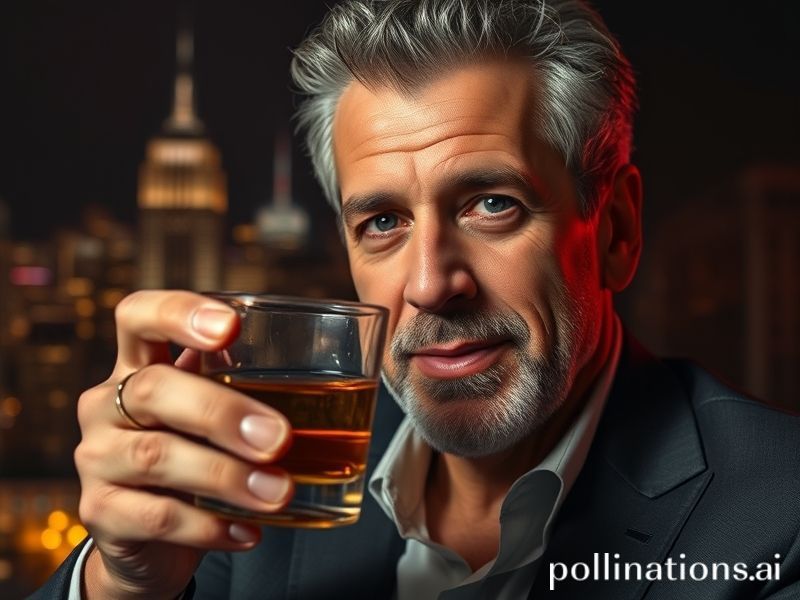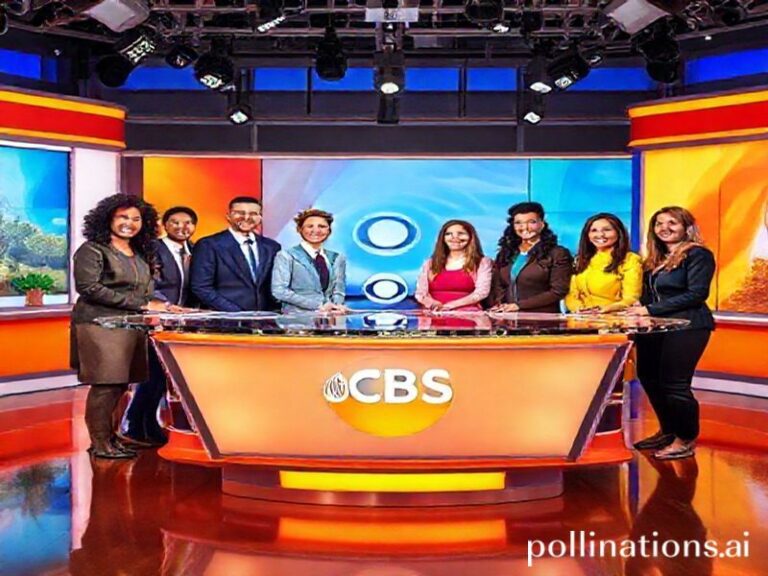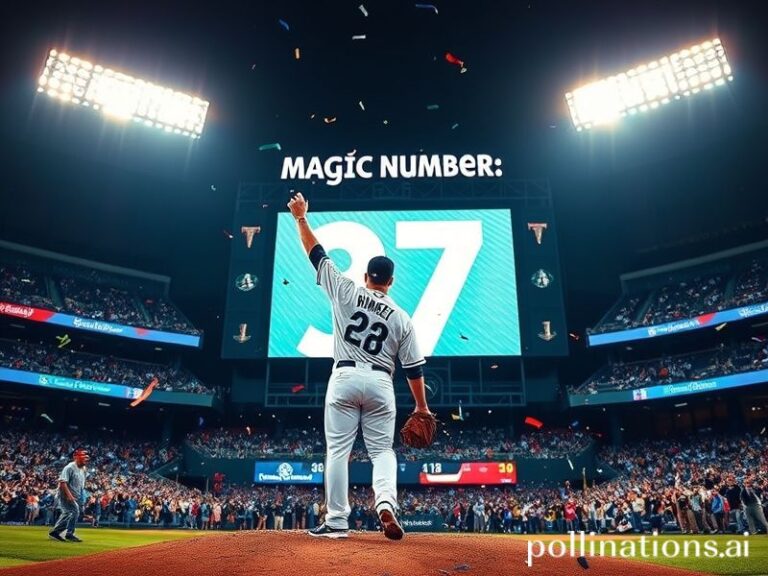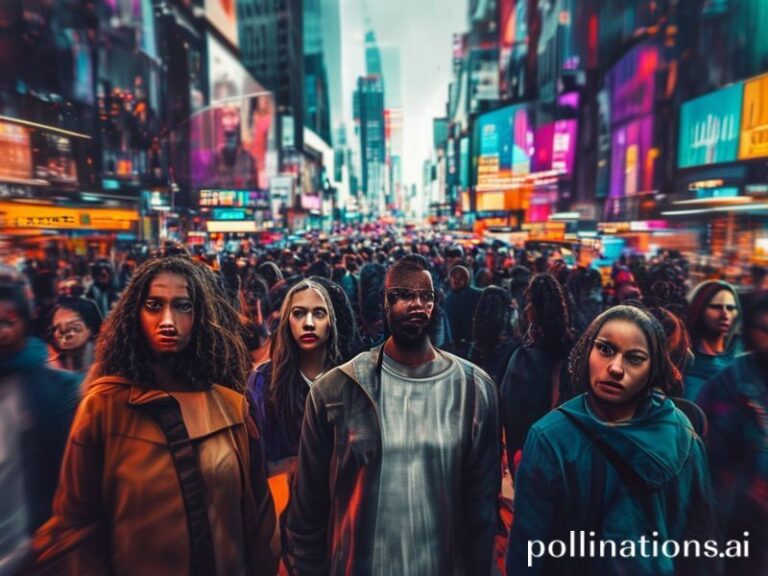Andy Cohen: The Accidental Diplomat Exporting American Meltdowns to 180 Countries
When the World Ends, Bravo Will Still Be Green-Lighting Reunions
by our correspondent in the last functioning embassy bar, somewhere between Reykjavík and oblivion
Somewhere in the rubble of 2024, while governments topple, oceans acidify, and TikTok teenagers auction their bathwater as NFTs, one American man keeps the global living-room lamp on. His name is Andy Cohen, and to the uninitiated he is merely the silver-haired impresario who turned wealthy women’s midlife crises into a sustainable export product. To the rest of us—jet-lagged diplomats, insomniac currency traders, UN interpreters on smoke breaks—he is the planet’s most reliable soft-power apparatus since the British Empire served gin.
Consider the numbers. The Real Housewives franchise, Cohen’s crown jewel, beams into 180 territories, from Lagos binge-clubs to Finnish saunas where subtitles freeze mid-screen. It is the rare U.S. cultural artifact that requires no translation: greed, Pinot Grigio, and revenge face are universal. In Singapore, civil servants unwind to the Beverly Hills edition; in São Paulo, plastic surgeons schedule “Palm Springs face-lift” packages after a single reunion episode. If UNESCO ever decides to preserve late-capitalist anthropology, they’ll skip the Louvre and head straight to Bravo’s vault.
The genius lies in packaging domestic chaos as geopolitical balm. When Russian oligarchs park their super-yachts in Montenegro, the crew below deck is streaming Potomac. When Chinese censors yank an episode for “excessive materialism,” bootleg DVDs appear in Guangzhou night markets labeled “Educational Documentary.” Cohen has, almost by accident, built the world’s most effective sanctions-proof propaganda: aspirational, addictive, and—crucially—harmless to regime stability. Try fomenting revolution when you’re busy debating whether Erika Jayne’s earrings are blood diamonds or just tacky.
Diplomats privately admit the Housewives serve as conversational lubricant in back-channel negotiations. Picture two envoys deadlocked over grain exports: one casually references Teresa Giudice’s table flip, the other laughs, trust is restored, and suddenly Odessa gets its wheat. NATO should invoice Cohen for services rendered.
Of course, the man himself remains a study in curated contradictions. By day he hosts a satellite-radio show where callers from five continents psychoanalyze a New Jersey nail-salon feud. By night he toggles between CNN’s New Year’s Eve broadcast—Ryan Seacrest’s grinning foil—and Instagram Live, where he dispenses boxed rosé to quarantined Italians. In 2022 he tested positive for Covid mid-broadcast, shrugged, and interviewed a Melbourne drag queen from isolation like a field reporter under mortar fire. The audience barely flinched; in the global scheme of things, another variant was just another season renewal.
Critics dismiss the empire as lowbrow escapism. They’re missing the point. Escapism is the point. While Europe renegotiates its energy grid on WhatsApp and Japan sells negative-yield bonds to ghosts, Cohen sells a fantasy where the worst outcome is a wig tugged askew. Climate refugees don’t get reunion specials, but then again neither do they get commercial breaks—small mercies.
There is, naturally, a final-season vibe to the whole enterprise. Ratings may wobble, streaming wars cannibalize cable, and Gen Z prefers micro-dosing rage on Twitch. Yet the brand persists, mutating like a successful virus. A Dubai edition launched last year, featuring oil heiresses who sip gold-leaf cappuccinos while discussing post-oil futures—postmodern enough to please the Davos crowd and grimly hilarious to the rest of us. If the petrodollar collapses, at least we’ll have footage.
In the meantime, Cohen keeps signing extensions the way hedge-fund titans hoard bunkers in New Zealand. Somewhere in an underground edit bay, a producer is already cutting a reunion for the Anthropocene: “You said I was melting the polar ice caps behind my back!” Cue gasps, cue Andy’s raised eyebrow, cue sponsorship by a vodka brand owned by a shell company headquartered in Delaware and the Cayman Islands. Roll credits over a drone shot of the last polar bear, sipping a skinny margarita.
When historians sift through the ashes, they’ll find our era’s Rosetta Stone wasn’t a treaty or a tweet but a split-screen of drunk socialites arguing about seating charts. And in the corner, forever bemused, will be Andy Cohen—our Pangloss with a martini, insisting this is, indeed, the best of all possible franchises.







